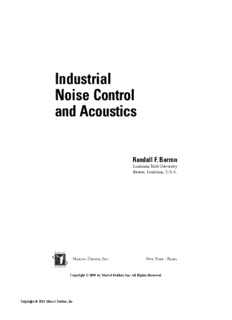
Industrial Noise Control and Acoustics PDF
Preview Industrial Noise Control and Acoustics
Industrial Noise Control and Acoustics Randall F. Barron Louisiana Tech University Ruston, Louisiana, U.S.A. Marcel Dekker, Inc. New York Basel • Copyright ©2001 by Marcel Dekker,Inc. All Rights Reserved. Copyright © 2003 Marcel Dekker, Inc. LibraryofCongressCataloging-in-PublicationData AcatalogrecordforthisbookisavailablefromtheLibraryofCongress. ISBN:0-8247-0701-X Thisbookisprintedonacid-freepaper. Headquarters MarcelDekker,Inc. 270MadisonAvenue,NewYork,NY10016 tel:212-696-9000;fax:212-685-4540 EasternHemisphereDistribution MarcelDekkerAG Hutgasse4,Postfach812,CH-4001Basel,Switzerland tel:41-61-260-6300;fax:41-61-260-6333 WorldWideWeb http://www.dekker.com The publisher offers discounts on this book when ordered in bulk quantities, For moreinformation,writetoSpecialSales/ProfessionalMarketingattheheadquarters addressabove. Copyright #2003byMarcelDekker, Inc.All Rights Reserved. Neitherthisbooknoranypartmaybereproducedortransmittedinanyformorby any means, electronic or mechanical, including photocopying, microfilming, and recording, or by any information storage retrieval system, without permission in writing from the publisher. Current printing (last digit): 10 9 8 7 6 5 4 3 2 1 PRINTED IN THE UNITED STATESOF AMERICA Copyright © 2003 Marcel Dekker, Inc. Preface Since the Walsh-Healy Act of 1969 was amended to include restrictions on thenoiseexposureofworkers,therehasbeenmuchinterestandmotivation in industry to reduce noise emitted by machinery. In addition to concerns aboutairandwaterpollutionbycontaminants,effortshavealsobeendirec- ted toward control of environmental noise pollution. Inresponse tothese stimuli, facultyatmanyengineering schoolshave developed and introduced courses in noise control, usually at the senior design level. It is generally much more effective to design ‘‘quietness’’ into aproductthantotryto‘‘fix’’thenoiseprobleminthefieldaftertheproduct has been put on the market. Because of this, many engineering designs in industry take into account the noise levels generated by a system. Industrial Noise Control and Acoustics was developed as a result of my 30 years of experience teaching senior-level undergraduate mechanical engineering courses in noise control, directing graduate student research projects, teaching continuing education courses on industrial noise control to practicing engineers, and consulting on various industrial projects in noise assessment and abatement. The book reflects this background, including problems for engineering students to gain experience in applying the principles presented in the text, and examples for practicing engineers to illustrate the material. Several engineering case studies are included to illustrate practical solutions of noise problems in industry. This book is Copyright © 2003 Marcel Dekker, Inc. designed to integrate the theory of acoustics with the practice of noise control engineering. Iwouldliketoexpressmymostsincereappreciationtothosestudents in my classes who asked questions and made suggestions that helped make the text more clear and understandable. My most heartfelt thanks are reserved for my wife, Shirley, for her support and encouragement during the months of book preparation, and especially during the years before I even considered writing this book. Randall F. Barron Copyright © 2003 Marcel Dekker, Inc. Contents Prefaceiii 1Introduction1 1.1NoiseControl1 1.2HistoricalBackground3 1.3PrinciplesofNoiseControl7 1.3.1NoiseControlattheSource8 1.3.2NoiseControlintheTransmissionPath9 1.3.3NoiseControlattheReceiver9 References10 2BasicsofAcoustics12 2.1SpeedofSound12 2.2Wavelength,Frequency,andWaveNumber13 2.3AcousticPressureandParticleVelocity15 2.4AcousticIntensityandAcousticEnergyDensity17 2.5SphericalWaves21 2.6DirectivityFactorandDirectivityIndex24 2.7LevelsandtheDecibel27 2.8CombinationofSoundSources31 v Copyright © 2003 Marcel Dekker, Inc. 2.9OctaveBands33 2.10WeightedSoundLevels34 Problems37 References40 3AcousticMeasurements41 3.1SoundLevelMeters42 3.2IntensityLevelMeters46 3.3OctaveBandFilters49 3.4AcousticAnalyzers50 3.5Dosimeter50 3.6MeasurementofSoundPower51 3.6.1SoundPowerMeasurementinaReverberant Room52 3.6.2SoundPowerMeasurementinanAnechoicor Semi-AnechoicRoom58 3.6.3SoundPowerSurveyMeasurements62 3.6.4MeasurementoftheDirectivityFactor66 3.7NoiseMeasurementProcedures69 Problems73 References76 4TransmissionofSound78 4.1TheWaveEquation78 4.2ComplexNumberNotation83 4.3WaveEquationSolution84 4.4SolutionforSphericalWaves88 4.5ChangesinMediawithNormalIncidence91 4.6ChangesinMediawithObliqueIncidence96 4.7SoundTransmissionThroughaWall101 4.8TransmissionLossforWalls107 4.8.1RegionI:Stiffness-ControlledRegion108 4.8.2ResonantFrequency111 4.8.3RegionII:Mass-ControlledRegion112 4.8.4CriticalFrequency113 4.8.5RegionIII:Damping-ControlledRegion113 4.9ApproximateMethodforEstimatingtheTL117 4.10TransmissionLossforCompositeWalls120 4.10.1ElementsinParallel121 4.10.2CompositeWallwithAirSpace122 4.10.3Two-LayerLaminate127 4.10.4Rib-StiffenedPanels131 Copyright © 2003 Marcel Dekker, Inc. 4.11SoundTransmissionClass134 4.12AbsorptionofSound139 4.13AttenuationCoefficient143 Problems153 References160 5NoiseSources162 5.1SoundTransmissionIndoorsandOutdoors162 5.2FanNoise164 5.3ElectricMotorNoise169 5.4PumpNoise171 5.5GasCompressorNoise173 5.6TransformerNoise177 5.7CoolingTowerNoise178 5.8NoisefromGasVents182 5.9ApplianceandEquipmentNoise185 5.10ValveNoise186 5.10.1SourcesofValveNoise186 5.10.2NoisePredictionforGasFlows188 5.10.3NoisePredictionforLiquidFlows190 5.11AirDistributionSystemNoise192 5.11.1NoiseAttenuationinAirDistribution Systems193 5.11.2NoiseGenerationinAirDistributionSystem Fittings195 5.11.3NoiseGenerationinGrilles198 5.12TrafficNoise207 5.13TrainNoise211 5.13.1RailroadCarNoise211 5.13.2LocomotiveNoise213 5.13.3CompleteTrainNoise214 Problems217 References222 6AcousticCriteria225 6.1TheHumanEar226 6.2HearingLoss229 6.3IndustrialNoiseCriteria231 6.4SpeechInterferenceLevel235 6.5NoiseCriteriaforInteriorSpaces238 6.6CommunityReactiontoEnvironmentalNoise243 6.7TheDay-NightLevel247 Copyright © 2003 Marcel Dekker, Inc. 6.7.1EPACriteria247 6.7.2EstimationofCommunityReaction250 6.8HUDCriteria253 6.9AircraftNoiseCriteria255 6.9.1PerceivedNoiseLevel256 6.9.2NoiseExposureForecast257 Problems262 References267 7RoomAcoustics269 7.1SurfaceAbsorptionCoefficients269 7.1.1ValuesforSurfaceAbsorptionCoefficients269 7.1.2NoiseReductionCoefficient270 7.1.3MechanismofAcousticAbsorption271 7.1.4AverageAbsorptionCoefficient274 7.2Steady-StateSoundLevelinaRoom274 7.3ReverberationTime281 7.4EffectofEnergyAbsorptionintheAir289 7.4.1Steady-StateSoundLevelwithAbsorptionin theAir289 7.4.2ReverberationTimewithAbsorptioninthe Air291 7.5NoisefromanAdjacentRoom293 7.5.1SoundSourceCoveringOneWall293 7.5.2SoundTransmissionfromanAdjacentRoom295 7.6AcousticEnclosures299 7.6.1SmallAcousticEnclosures300 7.6.2LargeAcousticEnclosures304 7.6.3DesignPracticeforEnclosures311 7.7AcousticBarriers312 7.7.1BarriersLocatedOutdoors313 7.7.2BarriersLocatedIndoors317 Problems321 References328 8SilencerDesign330 8.1SilencerDesignRequirements330 8.2LumpedParameterAnalysis332 8.2.1AcousticMass332 8.2.2AcousticCompliance335 8.2.3AcousticResistance338 8.2.4TransferMatrix339 Copyright © 2003 Marcel Dekker, Inc. 8.3TheHelmholtzResonator341 8.3.1HelmholtzResonatorSystem341 8.3.2ResonancefortheHelmholtzResonator342 8.3.3AcousticImpedancefortheHelmholtz Resonator343 8.3.4Half-PowerBandwidth344 8.3.5SoundPressureLevelGain348 8.4SideBranchMufflers350 8.4.1TransmissionLossforaSide-BranchMuffler351 8.4.2DirectedDesignProcedureforSide-Branch Mufflers357 8.4.3ClosedTubeasaSide-BranchMuffler361 8.4.4OpenTube(Orifice)asaSideBranch365 8.5ExpansionChamberMufflers368 8.5.1TransmissionLossforanExpansionChamber Muffler368 8.5.2DesignProcedureforSingle-Expansion ChamberMufflers371 8.5.3Double-ChamberMufflers373 8.6DissipativeMufflers377 8.7EvaluationoftheAttenuationCoefficient381 8.7.1EstimationoftheAttenuationCoefficient381 8.7.2EffectiveDensity383 8.7.3EffectiveElasticityCoefficient384 8.7.4EffectiveSpecificFlowResistance385 8.7.5CorrectionforRandomIncidenceEndEffects387 8.8CommercialSilencers389 8.9PlenumChambers391 Problems397 References405 9VibrationIsolationforNoiseControl406 9.1UndampedSingle-Degree-of-Freedom(SDOF)System407 9.2DampedSingle-Degree-of-Freedom(SDOF)System410 9.2.1CriticallyDampedSystem411 9.2.2Over-DampedSystem412 9.2.3Under-DampedSystem412 9.3DampingFactors413 9.4ForcedVibration419 9.5MechanicalImpedanceandMobility424 9.6Transmissibility427 9.7RotatingUnbalance431 Copyright © 2003 Marcel Dekker, Inc. 9.8DisplacementExcitation436 9.9DynamicVibrationIsolator439 9.10VibrationIsolationMaterials446 9.10.1CorkandFeltResilientMaterials446 9.10.2RubberandElastomerVibrationIsolators450 9.10.3MetalSpringIsolators457 9.11EffectsofVibrationonHumans464 Problems469 References474 10CaseStudiesinNoiseControl475 10.1Introduction475 10.2FoldingCartonPackingStationNoise476 10.2.1Analysis476 10.2.2ControlApproachChosen479 10.2.3Cost479 10.2.4Pitfalls480 10.3MetalCut-OffSawNoise480 10.3.1Analysis480 10.3.2ControlApproachChosen481 10.3.3Cost482 10.3.4Pitfalls482 10.4PaperMachineWetEnd482 10.4.1Analysis483 10.4.2ControlApproachChosen487 10.4.3Cost487 10.4.4Pitfalls488 10.5AirScrapHandlingDuctNoise488 10.5.1Analysis488 10.5.2ControlApproachChosen491 10.5.3Cost492 10.5.4Pitfalls492 10.6Air-OperatedHoistMotor492 10.7BlankingPressNoise494 10.7.1Analysis495 10.7.2ControlApproachChosen497 10.7.3Cost497 10.7.4Pitfalls497 10.8NoiseinaSmallMeetingRoom498 10.8.1Analysis499 10.8.2ControlApproachChosen502 10.8.3Cost503 Copyright © 2003 Marcel Dekker, Inc.
Description: